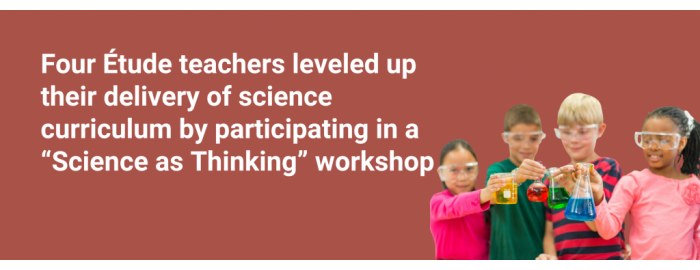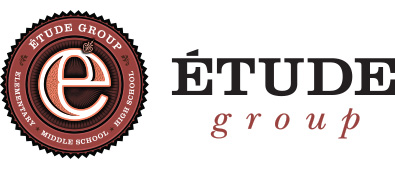
Every school teaches science to every student, but how can teachers make sure students are really learning and not merely memorizing? Last spring, four Etude teachers leveled up their delivery of science curriculum by participating in a “Science as Thinking” workshop.
Teachers Christin Campbell (grades 9-12), Brittany Hattabaugh (kindergarten), Allison McKeone (grades 2-3) and Nicholas Scharenbroch (grades 4-5) came away from the event with a better understanding of how to encourage more active and complete learning. The workshop was based on the book “Science as Thinking: The Constants and Variables of Inquiry Teaching.” Author Wendy Ward Hoffer was one of the presenters
“The big essential question for the workshop was, “How do we teach science for understanding?” Campbell said. “The workshop ushered teachers through the inquiry learning process acting as students so we could experience how it feels to learn through a mode that asks students to think and create their understanding using different resources, rather than listen and memorize. We worked as if we were students, then would stop to think about, discuss and note concrete actions we teachers can take to set up rich inquiry science learning like this.”
There are “three legs to the stool” of science learning, Campbell said:
1. Designing rich tasks that ask and allow students to do the figuring out.
2. Setting up interactions as a workshop where students move physically and mentally from independent thinking to different types of collaborative work requiring productive discussion.
3. Focusing on and deliberately monitoring (student and teacher) thinking strategies or moves used to get to a deeper understanding of an idea.
What do they mean by thinking strategies? Actions such as determining the importance of information, considering background knowledge, inviting students to ask their own questions and read between the lines, and utilizing sensory imagery and the process of allowing the process to grow over time.
McKeone said the workshop impressed upon her the importance of documenting the thinking process at the elementary level.
“We are very skilled at incorporating thinking routines within our lessons, but we might not be using them through the lens of a scientist versus a learner,” she said. “Activating schema with specific vocabulary as well as with written and visual documentation using thinking strategies during the workshop model is a new and exciting way to work with students not only during scientific-based lessons but also in all other areas of our classroom learning and discovery.
“In Chris’ case,” McKeone added, “she is a specialized science teacher where this documentation process may be more commonplace, whereas the elementary school teachers teach all subject areas within the classroom.”
The science as thinking model is especially relevant for Etude because that is what the school – at every level – is about: encouraging curiosity, imagination, discovery and accomplishment.
“The learning from this workshop fits in at Étude because it is all about what the students are doing, how the students are thinking and collaborating and how students are making meaning from their learning activities,” Campbell said. “The workshop taught us about some structure we can use within which the Étude Thinking Routines have an important role toward reaching student understanding.”
Hattabaugh said that thanks to the workshop, she has new priorities when she’s working with her kindergartners.
“One of my biggest takeaways was to be more purposeful while planning to choose routines that activate the type of thinking I’m trying to achieve,” she said. “For example, I might ask myself, ‘Am I trying to get my students to view different perspectives, organize their thoughts or revisit and dive deeper into previously discussed topics? My other big takeaway is that, in its simplest form, learners have three jobs in the scientific classroom: Activate their schema, build on their schema and delete misconceptions from their schema when needed. A well-thought-out scientific workshop includes a lot of trial and error, rich vocabulary and collaboration.”
Campbell said the workshop will alter the way she approaches lesson planning.
“Specifically, I am working on being more deliberate about the purpose, engage, scaffold and model parts that happen before students dive into their task,” she said. “These parts are essential to setting students up for successful thinking in any given task. The purpose does not give away the understanding they are supposed to discover, but does show them the question or problem they are trying to solve. Being more careful with my planning of the scaffolding and modeling part of the lesson should help reluctant or students lacking confidence enter into the task more easily without reducing the learning strength and depth of the lesson.”
As in all academic areas at Etude, the focus is on critical thinking, exploration and discovery, not grades.
“I want my students to gain confidence in their ability to think and reason about scientific concepts and that that is more important than right answers,” Campbell said. “Kids learn when they both have time to think alone and talk with peers.”

